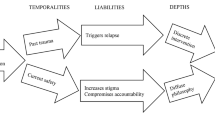Abstract
Both trauma-informed practices and trauma-specific services have been developed to meet the needs of individuals seeking services for mental health and substance use disorders. These approaches involve an acknowledgement of an individual’s inter-related experiences of trauma, mental health, and substance use problems in all aspects of service delivery, and focus on enhancing consumer safety and control. Although trauma-informed practices and trauma-specific interventions have been repeatedly identified as critical to service provision in this area, there is little understanding of how these practices and interventions are delivered and experienced from the perspectives of service users and providers. The purpose of this study was to explore facilitators and barriers in implementing trauma-informed practices and delivering trauma-specific services in mental health and addiction service settings through qualitative interviews with service providers, consumers and research experts. Based on thematic analysis of in-depth interviews with 19 participants (including service providers, research experts and consumers), a number of key facilitators and challenges to implementation of trauma-informed practices and services emerged. Key facilitators included: organizational support, community partnerships, staff awareness of trauma, a safe environment, peer support, the quality of consumer-provider relationships, consumer and provider readiness to change, and staff supports. Challenges included: provider reluctance to address trauma, lack of accessible services, limited funding for programs/services, and staff burnout. Key areas of change identified in the study point to the need for increased intersectoral collaboration and support, greater system-wide trauma awareness and provider training in order to enhance the ability of trauma-informed practices and -specific services to meet the complex needs of this population.
Similar content being viewed by others
References
Amaro, H., McGraw, S., & Larson, M. J. (2004). Boston consortium of Services for Families in recovery: a trauma-informed intervention model for women’s alcohol and drug addiction treatment. Alcoholism Treatment Quarterly, 22(3), 95–119.
Amaro, H., Chernoff, M., Brown, V., Arevalo, S., & Gatz, M. (2007). Does integrated trauma-informed substance abuse treatment increase treatment retention? Journal of Community Psychology, 35(7), 845–862. doi:10.1002/jcop.20185.
BC Centre for Excellence for Women’s Health. (2013). Trauma-informed practice guide. Vancouver, BC.
Braun, V., & Clarke, V. (2006). Using thematic analysis in psychology. Qualitative Research in Psychology, 3, 77–101.
Browne, A. J., Varcoe, C. M., Wong, S. t., Smye, V. L., Lavoie, J., Littlejohn, D...Lennox, S. (2012). Closing the health equity gap: evidence-based strategies for primary health care organizations. International Journal for Equity in Health, 11(59). doi:10.1186/1475-9276-11-59.
Couineau, A.-L., & Forbes, D. (2011). Using predictive models of behavior change to promote evidence-based treatment for PTSD. Psychological Trauma: Theory, Research, Practice, and Policy, 3(3), 266–275. doi:10.1037/a0024980.
Cusack, K. J., Morrissey, J. P., & Ellis, A. R. (2008). Targeting trauma-related interventions and improving outcomes for women with co-occurring disorders. Administration and Policy in Mental Health, 35(3), 147–158. doi:10.1007/s10488-007-0150-y.
Drabble, L. A., Jones, S., & Brown, V. (2013). Advancing trauma-informed systems change in a family drug treatment court context. Journal of Social Work Practice in the Addictions, 13(1), 91–113. doi:10.1080/1533256X.2012.756341.
Elliott, D. E., Bjelajac, P., Fallot, R. D., Markoff, L. S., & Reed, B. G. (2005). Trauma-informed or trauma-denied: principles and implementation of trauma-informed services for women. Journal of Community Psychology, 33(4), 461–477. doi:10.1002/jcop.20063.
Fallot, R. D., & Harris, M. (2002). The trauma recovery and empowerment model (TREM): conceptual and practical issues in a group intervention for women. Community Mental Health Journal, 38(6), 475–485.
Fallot, R. D., & Harris, M. (2005). Integrated trauma services teams for women survivors with alcohol and other drug problems and Co-occurring mental disorders. Alcoholism Treatment Quarterly, 22(3–4), 181–199.
Farro, S. A., Clark, C., & Hopkins Eyles, C. (2011). Assessing trauma-informed care readiness in behavioral health: an organizational case study. Journal of Dual Diagnosis, 7(4), 228–241.
Fereday, J., & Muir-Cochrane, E. (2006). Demonstrating rigor using thematic analysis: a hybrid approach of using inductive and deductive coding and theme development. International Journal of Qualitative Methods, 5(1), 1–11.
Ford, J., & Russo, E. (2006). Trauma-focused, present-centered, emotional self-regulation approach to integrated treatment for posttraumatic stress and addiction: trauma adaptive recovery group. American Journal of Psychotherapy, 60(4), 335–355.
Glaser, B. G., & Strauss, A. L. (1967). The discovery of grounded theory: strategies for qualitative research. Chicago: Aldine DeGruyter Publishing.
Klinic Community Health Centre (2013). Trauma-informed: the trauma toolkit. Winnipeg, MB: Klinic Community Health Centre.
Lynch, S. M., Heath, N. M., Mathews, K. C., & Cepeda, G. J. (2012). Seeking safety: an intervention for trauma-exposed incarcerated women? Journal of Trauma & Dissociation, 13, 88–101.
Markoff, L. S., Finkelstein, N., & Kammerer, N. (2005a). Implementing a model of change in integrating services fo women with sbustance abuse and mental health disorders and histories of trauma. Journal of Behavioral Health Services and Research, 32(2), 227–240.
Markoff, L. Reed, G. B., Fallot, R. & Eliott, D. (2005b). Implementing a trauma-informed alcohol and other drug and mental health services for women: lessons learned in a multi-site demonstration project. American Journal of Orthopsychiatry, 75(5), 525–539.
Moses, D. J., Reed, B. G., & Ambrosio, B. D. (2003). Creating trauma Services for Women with Co-occurring disorders: experiences from the SAMHSA women with alcohol, drug abuse and mental health. Substance Abuse and Mental Health Services Administration (SAMHSA): Disorders.
Najavits, L. (2009). Seeking safety: an implementation guide. In A. Rubin & D. W. Springer (Eds.), The Clinician’s Guide to Evidence-Based Practice. Hoboken, NJ: John Wiley.
Najavits, L. M., & Hien, D. (2013). Helping vulnerable populations: a comprehensive review of the treatment outcome literature on substance use disorder and PTSD. Journal of Clinical Psychology, 69(5), 433–479. doi:10.1002/jclp.21980.
The Jean Tweed, C. (2013). Trauma matters: guidelines for trauma-informed practices in women’s substance use services. Toronto.
Twaddle, I. K. B., Setpaul, R., Guerrero, V. E. L., Manibusan, A. I., & Riddle, J. A. (2006). Countering correctional discourse: development of a feminist support group for women prisoners in Guam. Women & Therapy, 29(3–4), 215–237.
Acknowledgments
This study was funded by a grant from the Ontario Ministry of Health and Long-Term Care.
Author information
Authors and Affiliations
Corresponding author
Ethics declarations
Conflict of Interest
Maritt Kirst, Anjana Aery, Flora I. Matheson, and Vicky Stergiopoulos declare that they have no conflict of interest.
Informed Consent
All procedures followed were in accordance with the ethical standards of the responsible committee on human experimentation (institutional and national) and with the Helsinki Declaration of 1975, as revised in 2000 (5). Informed consent was obtained from all patients for being included in the study.
Rights and permissions
About this article
Cite this article
Kirst, M., Aery, A., Matheson, F.I. et al. Provider and Consumer Perceptions of Trauma Informed Practices and Services for Substance Use and Mental Health Problems. Int J Ment Health Addiction 15, 514–528 (2017). https://doi.org/10.1007/s11469-016-9693-z
Published:
Issue Date:
DOI: https://doi.org/10.1007/s11469-016-9693-z




